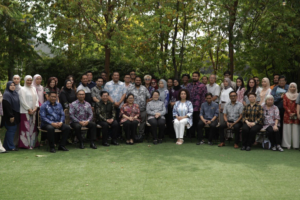Online News – Are they for real?
With the advancement of internet technologies, we are able to see the world without leaving the comfort of our homes. Through it, we can get the latest scoop on gossips, news and happenings. During and after our recent general elections, there had been an increase in intensity and amount of political scandals and news that broke on the internet. But how credible are these stories? Nevertheless, it definitely made reading news online a lot more exciting!
When the internet was first introduced in the last century, its main purpose was to connect people and bring us closer together. Social networking sites like Facebook, Twitter, blogs, are just some of the communication platforms that enabled the connections and made the exchange and sharing of information so much more convenient and efficient.
The pervasive network of information and sharing amongst internet users has long infiltrated our lives. For the younger generation and their smart & connected devices, it has already become their way of communication. It has also enabled internet users from around the world to read news, share pictures, videos and messages all at once.
Unfortunately, the internet is not very peaceful place these days. Originally intended as a platform to strengthen relationship and connections, for some the internet has become a platform and tool for propaganda. They can now spread and convey information to a wide audience, and because of the diversity of internet users, this inevitably lead to a heated exchange of opinions, videos and images that can sometimes be offensive and slanderous, to the point where one may ignore basic moral values.
Following a story…
Since the final quarter of last year, when rumours of the dissolution of parliament started circulating, the internet had been used by politicians and their adversaries as a means of sharing news, and the sites that broke scandalous news about politicians had successfully attracted a following amongst internet users.
This is not necessarily typical of the online media, but some politicians used nicknames or poise as anonymous internet users to expose the weaknesses or insider’s scoop of their adversaries. This became the target of public opinions and criticism, and created an invisible yet powerful tension amongst netizens, with the ultimate purpose of putting an end to each other’s career. This hype and hotly debated story creates a following.
During this process, netizens who are mostly observers on the sidelines may not be really interested in the eventual outcome. What they are more interested is the next big scoop or the untold secrets from both sides of the divide.
In our virtual online world, some people would take extra care in distinguishing what they read online and verify the accuracy of the news before deciding whether to share it with others; some others would take a more casual approach, where reading news is a matter of passing time and accuracy is not as important; and you have some others who just follow the drift of the masses as the truth, and possibly ignoring the facts.
With a continuous flow of scandalous news, some may stop and ask about the validity of the news. The answer is an ambiguous yes and no, and it depends on one’s level of trust for the politicians and the whistle-blowers. Either we choose to believe, or have doubt, or think it’s nonsense, the originator has already achieve their purpose of sharing information. The motivation and truth of the matter is sometimes ignored.
Interest in insider news outweigh those from main stream media
Websites that breaks scandalous news has successfully attracted the interests of netizens. It’s free for all to read operating model has also become a threat and challenges the traditional paid media organisation. This has also become a reference and learning for the traditional media business.
For a traditional newspaper media, the sharing of news online has already become a core component that cannot be ignored for a sustainable development and growth. As for distinguishing the source and truth of what’s reported, there are many areas requiring further study and improvement and that’s when things become challenging. At the end of the day, the tasks lay on the editors and reporters and their ability to filter through all the clutter, find what’s interesting for their readers, and present them as it is without any ulterior motives.
Any reporter will not miss the opportunity to pick up on a scoop. But they must stay grounded, verify over the phone and check with the source of the story and determine for themselves if there is truth in what’s being shared. This ultimately helps in building credibility and value for the online news report. Unfortunately when there was an explosion of such scandalous news, there weren’t many who were willing to verify and expose the truth of the matter.
Hearsay is not the ‘real’ news
Today, with the advent of the internet, it has become a space and platform for netizens to express their opinions. This same platform and online culture has since expanded their horizon, and shaped their views and ideals of the country, politics and society.
The internet is a level playing ground for everyone to choose their preferences, based on their own values and believes, and to freely share and publish opinions and messages. The main purpose of the internet is for active sharing of ideas, and is not only for the young at heart. If we do not objectively look at the sample survey results, this could mislead the industry or community.
We must be critical on all reported news and not to simply trust all news that’s shared. Scandalous sites and their news and comments can be a double-edged sword, and may reflect only the opinions of the publisher and not the general community at large. We should take caution when believing what we read, and not to let hearsay or rumours be taken as news.
网络爆闻是真是假?
网络资讯媒介发达,让我们眼观六路,耳听八方,真正实现了足不出户便知天下事。全国大选近在眉睫,互联网爆出的政治丑闻愈来愈多,愈来愈激烈,但可信度多高?
互联网魅力无法挡,在大选风愈吹愈强之下,网络爆料新闻站愈来愈精彩!
上个世纪出现的互联网,目的是要加强人与人之间的联系,社交网站如面子书、维特等,还有部落格等都是其中的沟通平台,除了提供资讯与便利,也鼓励网民积极分享传播信息。
无孔不入的网络信息与网民的分享,早已渗入我们的生活,也成为新新人类的沟通方式,透过先进的数码器材,世界不同角落的网民都可以同时间阅读与分享图片、视频与讯息。
可惜,网络不再平静。原本为加强彼此关系的互联网,被一些“有心”网民利用为宣传且带攻击性的工具,广泛传达其所要散播的信息,却因网民素质不一,难免出现一些内容过火、攻击性的图文与视频,漠视诽谤与诋毁的道德观念。
当解散国会的谣言从去年第四季盛传时,互联网早已成为政客或“枪手”发布消息的桥梁。这些爆料网站赤裸裸地把政客的丑闻公布在网络上,成功吸引网民与社会“步步跟踪”。
网民追踪发展
不过这并不一定是网络媒体的作为,不少政客,或以代号取代的匿名网民,开始在网络上揭露对手或被攻击者的内幕与缺点,引发网民的舆论继续评击目标,凝聚网民的力量似乎要让目标置于死地,一股无形的强大张力在网络世界中蔓延,令网民紧密追踪。
在这个过程中,不少网民抱着隔岸观火的态度,事情发生的结果并非是网民所期待的,其实大部份人想看的是政客与政客之间互相挖出不可告人的秘密。
虚拟的网络世界上,有人小心翼翼分辨网上流传的讯息的正确性,再考虑要不要与他人分享;有人随心所欲只为消磨时光,真伪对他来说并不重要;有人只要看到有很多网民认同,也随波逐流成为一份子,根本不理会是真或假。
当爆料新闻不断地在网络上盛传时,有人会提问:这些网络新闻或内幕是否属真实?答案同样是模棱两可,在于网民对该政客与爆料者的信任度,不管是选择相信或是半信半疑,或是认为一派胡言,早已达到要传播的目的,制造话题的背后动机也许早已被忽略。
内幕新闻超越平面媒体
互联网爆料新闻网站成功吸引大批网民关注,由于是免费阅读,这些爆料网站大大打击了付费网络媒体机构,更成为平面媒体追新闻的资料参考来源。
对于网络爆闻,报章不得不将它作为一种可持续发展的报道,但在处理新闻的真相时却有很多地方需要研究和挖掘。这就非常考功夫了,编辑与记者是否有一双慧眼,能否在一堆口水帖中发现重大新闻预兆,剔除无聊的、虚假的、别有用心和煽动性的材料等须靠智慧与分析能力。
面对骇人听闻的事件,记者肯定不愿错过线索,只要实地看一下,甚至打个电话给爆闻中的主角了解一下,不难找出一些真相,那么假消息背后就是一则很有价值的新闻。遗憾的是,爆闻在众多网站飞速传播,却没有几家媒体出面揭露。
不把传闻当新闻
如今,互联网的出现,的确让这些人士有更多发挥的空间与平台,公众的视野因而变得更广阔,潜移默化的网络文化令新新人类对国家、社会与政治有着不同的想法。
网络上的花边新闻或爆闻在网络上铺天盖地,很明显,这些真真假假,跟平面媒体比较之下,后者则有新闻自律。
网络是一个自由乐园,网民可以依照自己的喜好,依照自己的价值判断,随意地发布言论和消息。网络的主体是思想活跃却不无偏激的年轻人,连随机调查、抽样调查的客观性都没有,如果这样的声音不能得到正确引导,可能会误导整个社会。
我们必须实事求是地对待网络爆闻,不能简单地把网络发帖等同于新闻素材。网络爆闻是一把双刃剑,因为在网上发言的群体太具有个体性和随意性,新闻媒体在广泛选择的同时,要谨慎使用,绝对不能把传闻当新闻,以讹传讹。











